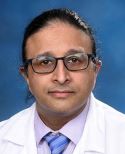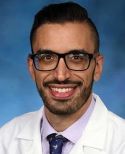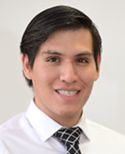2024 News
Physician-Scientists in Critical Care Medicine Receive Support from New Incubator Program
September 04, 2024
Physician-Scientists in Critical Care Medicine Receive Support from New Incubator Program
Last year, UMSOM teamed up with the NIH Clinical Center to launch a new collaborative program to mentor physician-scientists in launching successful, independent research programs. The UMSOM-NIH Physician Scientist Incubator Program was established by Henry Masur, founder of the NIH Department of Critical Care Medicine, who also holds an appointment in anesthesiology at UMSOM, and UMSOM Dean Mark Gladwin. The incubator program allows select UMSOM MD/PhD scholars to spend time at the NIH Clinical Center, the nation’s largest hospital dedicated to clinical research, and select NIH scholars to spend time at UMSOM and work within a larger health system.
“There have been fewer and fewer physicians doing science since a peak in the 1980s, so this program is designed to support physician-scientists at a vulnerable time in their careers—transitioning from mentored researchers to independence—with help on career development grant applications, access to research mentors and professional development programs across two institutions, and to foster interactions and cross talk, and establish a pipeline where we can leverage each other’s strengths,” says Jason J. Rose, MD, MBA, an associate professor of medicine, Associate Dean of Innovation and Physician Science Development, and division chief of pulmonary, critical care and sleep medicine. Rose helps run the incubator program with Chris O’Donnell , and Henry Masur and Nitim Seam at NIH.
For NIH junior faculty and trainees who pursue academic careers outside NIH, this partnership provides more mentorship and help with career development. Thus the incubator program is partnering with CARTI to provide professional development and research training and education, particularly grant writing instruction, to program participants.
The incubator program launched with two scholars from each institution and program leaders hope to add one scholar from each institution each year. Due to the leaders’ focus on critical care medicine, the program will tap the natural pipeline of pulmonary and critical care fellows, identifying those whose work would benefit from exposure to the other organization. The goal, says Rose, is to help the scholars develop and differentiate their work through access to different mentors, and help the scholars build out strong mentorship teams to guide their research.
“I have really benefitted from CARTI training,” says Omar Harfouch, MD, MPH, one of the inaugural UMSOM-NIH Physician Scientist Incubator Program cohort members. “I hadn’t applied for federal funding prior to taking a CARTI class, but it was great, Marey Shriver is great, I recommend CARTI to all my colleagues." He says the K writing class provided structure and a cadence to writing that he very much needed.
Harfouch studies anal cancer, a rare cancer and understudied cancer caused exclusively by HPV infection and predominantly impacts people with HIV infection and compromised immune systems. Many anal cancer patients are transgender women, a population that suffers discrimination. Harfouch is using next gen sequencing to study HPV16 infection and guide the study of the immune response to HPV16, the strain responsible for most HPV-associated cancers. His goal is to develop new techniques to prevent anal cancer.
“Marey’s spirit is so encouraging, and CARTI offers so much support, it’s one of the main resources that helped me in building my research proposal,” says Harfouch, who holds an ICTR ATIP grant. He is also grateful for the supportive institutional environment, his mentor group, and the UMSOM-NIH Physician Scientist Incubator Program. “It was such a privilege to be able to present my research proposal at the launch of this program and receive feedback from Dean Gladwin and other research leaders, the strength of my proposal improved greatly.”
The inaugural cohort of the UMSOM-NIH Physician Scientist Incubator Program
 Ananth V. Charya, MD, MS, is an assistant professor of medicine at UMSOM and performing research in the Laboratory of Applied Precision Omics at the National Heart, Lung, and Blood Institute where he is looking for new approaches to detecting and treating rejection of lung transplants.
Ananth V. Charya, MD, MS, is an assistant professor of medicine at UMSOM and performing research in the Laboratory of Applied Precision Omics at the National Heart, Lung, and Blood Institute where he is looking for new approaches to detecting and treating rejection of lung transplants.
 Omar Harfouch, MD, MPH, is an assistant professor of medicine at UMSOM and member of the THRIVE—Together, Healing, Reaching, Inspiring, to achieve Victory over illness and Embrace life—program at the Institute of Human Virology that specializes in preventing, treating and manages infectious diseases including hepatitis C and HIV. His research focuses on immunology of HPV infection and anal cancer in transgender women.
Omar Harfouch, MD, MPH, is an assistant professor of medicine at UMSOM and member of the THRIVE—Together, Healing, Reaching, Inspiring, to achieve Victory over illness and Embrace life—program at the Institute of Human Virology that specializes in preventing, treating and manages infectious diseases including hepatitis C and HIV. His research focuses on immunology of HPV infection and anal cancer in transgender women.
 Julio Huapaya, MD, is a pulmonary and critical care fellow with interest in interstitial lung disease. In particular, he has studied interstitial pneumonia with autoimmune features and found that IPAF includes heterogeneous populations and better defining subgroups of patients could improve diagnosis, treatment and possibly prognosis for specific patients.
Julio Huapaya, MD, is a pulmonary and critical care fellow with interest in interstitial lung disease. In particular, he has studied interstitial pneumonia with autoimmune features and found that IPAF includes heterogeneous populations and better defining subgroups of patients could improve diagnosis, treatment and possibly prognosis for specific patients.
 Shreya M. Kanth, MD, is a staff clinician and pulmonary consultant at the National Heart, Lung, and Blood Institute. Her primary research interest is in the cellular and molecular pathogenesis of acute respiratory distress syndrome (ARDS). Currently, she is investigating the role of semaphoring 5A in translational models of endotoxin-induced lung injury. She is also evaluating the natural history of patients who have recovered from SARS-CoV-2 infection.
Shreya M. Kanth, MD, is a staff clinician and pulmonary consultant at the National Heart, Lung, and Blood Institute. Her primary research interest is in the cellular and molecular pathogenesis of acute respiratory distress syndrome (ARDS). Currently, she is investigating the role of semaphoring 5A in translational models of endotoxin-induced lung injury. She is also evaluating the natural history of patients who have recovered from SARS-CoV-2 infection.
Contact
Please visit our CARTI Contact Us page.
